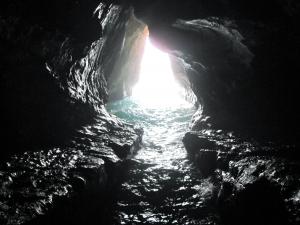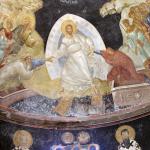CAPUT II.
How we ought both to be united and render praise to the Cause of all and above all.
WE pray to enter within the super-bright gloom, and through not seeing and not knowing, to see and to know that the not to see nor to know is itself the above sight and knowledge. For this is veritably to see and to know and to celebrate super-essentially the Superessential, through the abstraction of all existing things, just as those who make a lifelike statue, by extracting all the encumbrances which have been placed upon the clear view of the concealed, and by bringing to light, by the mere cutting away, the genuine beauty concealed in it. And, it is necessary, as I think, to celebrate the abstractions in an opposite way to the definitions. For, we used to place these latter by beginning from the foremost and descending through the middle to the lowest, but, in this case, by making the ascents from the lowest to the highest, we abstract everything, in order that, without veil, we may know that Agnosia, which is enshrouded under all the known, in all things that be, and may see that superessential gloom, which is hidden by all the light in existing things.
 Mystical theology takes us out of ourselves. Its goal is to provide us the means by which we realize our union with God, and in that union, to find ourselves ecstatically lifted up beyond ourselves, perceiving all things and knowing all things in and through God. Before we find ourselves experiencing the fullness of the kingdom of God, we must cut off all our normal means of perception, recognizing and accepting our ignorance outside of God so that we will feel free to invoke God to enlighten us with his transcendent glory:
Mystical theology takes us out of ourselves. Its goal is to provide us the means by which we realize our union with God, and in that union, to find ourselves ecstatically lifted up beyond ourselves, perceiving all things and knowing all things in and through God. Before we find ourselves experiencing the fullness of the kingdom of God, we must cut off all our normal means of perception, recognizing and accepting our ignorance outside of God so that we will feel free to invoke God to enlighten us with his transcendent glory:
WE pray to enter within the super-bright gloom, and through not seeing and not knowing, to see and to know that the not to see nor to know is itself the above sight and knowledge.
God by his transcendent nature is invisible, incapable of being seen by our senses, incapable of being comprehended by our mind. We will always fail to attain him when we try to grasp him with our finite capabilities. Yet, as St. Athanasius explained, we are able to perceive him indirectly by his works and know him in bodily form thanks to the incarnation:
As, then, he who desires to see God Who by nature is invisible and not to be beheld, may yet perceive and know Him through His works, so too let him who does not see Christ with his understanding at least consider Him in His bodily works and test whether they be of man or God.[1]
God, who is beyond our perception and incapable of being known by us as he is in himself has revealed himself to us in Christ, and through Christ we can perceive his transcendent glory. His works reveal him and his existence. We know him, not only by the works he has done as creator, but by what he has revealed to us in his divine economy. Try as we might to see and know God directly with our own natural powers, we cannot; yet, God in his bountiful love for us enlightens us. He gives us the grace which not only perfects us, but deifies us, making as children of God. We are illuminated by his glory. We come to know him through himself. But to truly know him, to truly perceive him, we must abandon our senses and our ordinary way of knowing. We must cut it all off, expect nothing from them, and hold on to nothing which they give to us. For then we will be ready to receive from him what he reveals of himself to us. Once our senses and mind our silenced, we truly let ourselves die so as to be raised back up in God. Then we will see him in the light of his majesty, a light which shines so bright that it overwhelms us with a super-bright gloom. The allegory of Plato’s cave tells us what to expect: as we come out of the darkness of our ignorance, we will come into the light, a light which will be so bright, it will blind us, making it appear as if we are once again in darkness. But then we will find ourselves illuminated by that light, revealing in and through it, the glory which the darkness did not let us see.
But it is key for us to accept our ignorance, to embrace the darkness, to accept our need for illumination. We need to realize until our union with God, our thoughts and opinions, however good and useful, will only lead us so far; so long as we hold onto them, they hold us back and will keep us away from our goal. We must embrace the darkness so that we can then accept the bright gloom of God, the bright darkness that transcends us, allowing it to penetrate and transform us. We have to cast out all our thoughts about God, what we think we know about God in order to let God show himself, revealing directly to us the truth which transcend our knowledge or ability to come to know. Then we will truly perceive God directly and know him in a sight beyond sight with a knowledge beyond knowledge. Embracing our ignorance is the foundation by which we can apprehend the truth which we desire to know.
We must accept our limits and use those limits in order to cast them aside. We must recognize and accept our unknowing if we want to know, just as we must accept our blindness if we want to see. The bright truth of God illuminates in that darkness if we but first embrace that darkness where God is to be found. St. Albert the Great, therefore, tells us that “This is not simply a case of privation, there is a reception of a kind of habitual light, which leads to the actuality of some vision of God.”[2] We negate ourselves so that we can open ourselves up to the positive foundation of being and truth through the grace of God; thus, as Albert continued, “what is being denied is our natural way of seeing, and what is left is a receiving of a supernatural light which is, all the same, best indicated by negation, because we find nothing which is known to us which we can properly predicate of God because of his transcendent simplicity…”[3] We deny ourselves to ascend, not descend; we realize our sight cannot see God so we close it off so that we can perceive God through his supernatural grace; we realize we cannot know God, so we cut off our discursive thought and all attempts to reason out in our mind what we think God is like so that we can let God reveal himself to us and know him through his self-revelation.
Our goal is to truly see and know God. But this is not something we can do all by ourselves. So long as we try to attain God in ourselves through our natural ability we will not see or know him; we will perceive his works, and know about him in relation to those works, which obviously is beneficial to us as it makes us come to know God exists and is worthy of our desire, but in the end, we must desire God as he is and not God as we make him out to be. We must pray and accept our position before him, to know our limits and accept them so that we can cast off all attempts to comprehend the invisible God with material senses and limited minds. Then we can enter the bright illuminating darkness of God and come to see and know him beyond all natural means.
[Image=The dark and the light of Rosh Hanikra by Sayhey1111 (Own work) [CC BY-SA 3.0 (https://creativecommons.org/licenses/by-sa/3.0)], via Wikimedia Commons]]
[1] St. Athanasius, On the Incarnation. Trans. A Religious of C.S.M.V. (Crestwood, NY: St Vladimir’s Seminary Press, 1982), 92.
[2] St. Albert the Great, “Commentary on Dionysius’ Mystical Theology” in Albert & Thomas, Selected Writings. Trans. Simon Tugwell, OP (New York: Paulist Press, 1988), 172.
[3] St. Albert the Great, “Commentary on Dionysius’ Mystical Theology,” 172.
Stay in touch! Like A Little Bit of Nothing on Facebook













